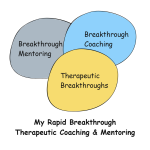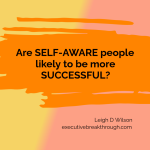Leigh D Wilson
Hi, I thought I’d talk about how the way we think about our experiences can change the actual nature of the experience.
This might be a rather strange place to be making a video!
My name’s Leigh D Wilson. I’m a Master Executive Mindset Coach and I help busy professionals overcome their inner struggles so that they can quickly start to enjoy much greater success and enjoyment in their lives.
I happen to be sitting in the emergency department of my local hospital. I’ve had an unfortunate accident in that a dog has bitten the back of my hand and taken out quite a chunk of skin and I’m waiting here to be attended to. There are 42 people ahead of me so I’m probably going to be here for quite a while. I’ve already been here for a couple of hours, but I thought I might be able to use the time usefully by making this video. Last time I was here I was here for 30 hours, so it’s not going to be a rush. 🙂
Now suffering from something like this, it’d be very easy to sit here and think “oh, it’s just not fair”, “that shouldn’t have happened”, “how unlucky I am”, “I’m really frustrated having to wait, here”, “it’s so annoying”, “it’s just not fair”, “you know I hate this” and I could be resisting it massively and making the whole experience very, very unpleasant.
Reframing
But there is a skill called “reframing” that you can learn and it’s something you want to practice so that to use whenever you want to reframe unpleasant experiences.
So, in this case, I’m saying to myself: “well this this is not a bad chance to just sit down and relax. I can meditate a bit, I can practice my mindfulness, I can practice acceptance, I can practice just accepting what’s happened. It’s happened, I can’t change it and I’ll just try and make the most of it”.
I can reframe it by saying “well there’s a lot of people here who have probably had a lot worse things have happened to them and I’m very lucky that I’m not one of them.”
I could also say “you know, this this incident could have been far worse. Maybe the dog could have bitten off a finger or something! So, in many ways I’m very, very lucky and I’m very lucky to be in this first-class hospital and have the terrific people working in this hospital to look after me”.
So, there are many positives I can look out for to see in the situation, to reframe it, and, if I think about them, the pain diminishes a lot. I feel a lot better and I’m not nearly as troubled by what’s happened. If I’d been thinking the other way, the time would be taking its toll, the pain would be greater and the whole thing would have been a very, very unpleasant experience.
So, while it might seem a bit strange, I thought I’d use this time gainfully and try and pass on this message. I believe very much that “nothing is good nor bad lest thinking makes it so”, as Shakespeare once said and the way you choose to think about the things that happen to you can very much influence the way you experience them.
Thank you.
Edited transcript







